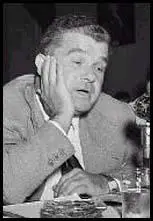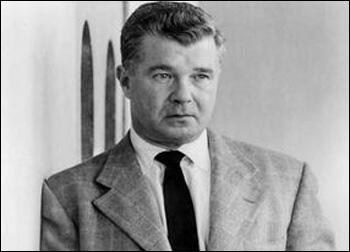Robert Rossen

Robert Rossen was born in New York on 16th March, 1908. As a young man he became a professional boxer but later turned to writing plays. Rossen's plays often dealt with political issues and he eventually joined the Communist Party. He later explained to his son that at the time it was "a party dedicated to social causes of the sort that we as poor Jews from New York were interested in".
After the success of The Body Beautiful (1936), Rossen got a contract with Warner Brothers. Over the next nine years he wrote twelve film scripts including Marked Woman (1937), The Roaring Twenties (1939), A Child is Born (1940), Blues in the Night (1941), The Sea Wolf (1941), Edge of Darkness (1942) and a Walk in the Sun (1945).
Rossen turned to directing movies in 1947 with the highly acclaimed Body and Soul (1947). This was followed by the Academy Award nominated, All the King's Men (1949), a film based on the life of the radical politician, Huey Long, and The Brave Bulls (1951).
After the Second World War the House of Un-American Activities Committee (HUAC) began an investigation into the Hollywood Motion Picture Industry. Rossen was one of those named as a former member of the Communist Party. He appeared before the HUAC on 25th January, 1951, but like the Hollywood Ten, refused to name other party members.

Rossen was blacklisted and was unable to find work over the next two years. Rossen was offered a deal and on 7th May, 1953, he appeared again in front of the House of Un-American Activities Committee. This time Rossen gave the HUAC the names of fifty-seven members of the Communist Party.
After his testimony Rossen was free to pursue his career in Hollywood. This included the films Mambo (1954), Alexander the Great (1956), Island in the Sun (1956), They Came to Cordura (1959), The Hustler (1961) and Lilith (1964).
Robert Rossen died on 18th February, 1966.
Primary Sources
(1) Stephen Rossen, Robert Rossen's son, later explained why his father decided to testify before the House of Un-American Activities Committee.
It killed him not to work. He was torn between his desire to work and his desire not to talk, and he didn't know what to do. What I think he wanted to know was, what would I think of him if he talked? He didn't say it in that way, though. Then he explained to me the politics of it - how the studios were in on it, and there was never any chance of his working. He was under pressure, he was sick, his diabetes was bad, and he was drinking. By this time I understood that he had refused to talk before and had done his time, from my point of view. What could any kid say at that point? You say, "I love you and I'm behind you."
(2) Robert Rossen appeared before the House of Un-American Activities Committee on 7th May 1953 and explained why he changed his mind about naming the names of former members of the Communist Party.
Robert Rossen: I don't think after two years of thinking, that any one individual can ever indulge himself in the luxury of individual morality or pit it against what I feel today very strongly is the security and safety of this nation.
Clyde Doyle: In other words, you are now willing to be labeled a stool pigeon and an informer.
Robert Rossen: I don't feel that I'm being a stool pigeon or an informer. I just won't accept that characterization. I know what I feel like within myself. Characterization or no characterization, I don't feel that way.

